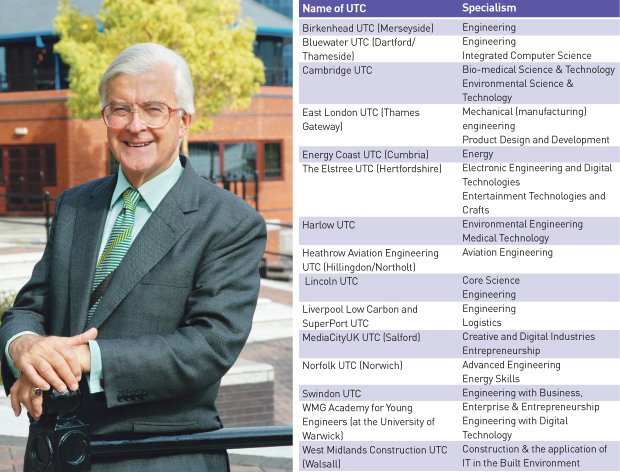A further 15 University Technical Colleges (UTCs) are to be funded by the government and rolled out over the next two years. The announcement will nearly double their number to 34.
The government is investing £8 to £10 million for each UTC to help them get started, including building costs, and will then give the same amount of money per pupil that other secondary schools receive.
Lord Hill, the Schools Minister said he was “very pleased” to be announcing the approval of more UTCs. “Right around the country there is a lot of enthusiasm from employers, universities, pupils and parents for high quality, rigorous technical education.
“They provide more choice for children as well as helping provide the kind of highly skilled technicians our economy needs.”
The UTC model is the brainchild of Lord Baker and the late Lord Dearing, who decided four years ago that the one thing missing from the education system was technical colleges.
The institutions are for 14 to 19 year-olds and each has one or two specialisms – ranging from engineering, to manufacturing, to construction or bio-medical sciences.
The technical course is taught alongside a core GCSE curriculum, and some pupils go on to A Level subjects.
Students spend about 60 per cent of their time on academic study and work the business hours that would be expected of them in industry (for example, 8:30am
to 5pm).
All UTCs are supported by a university, a range of local employers and very often an FE college.
One of the two UTCs currently open, the JCB Academy in Staffordshire, is backed by a multinational construction company, and the presence of big business is felt strongly in the upcoming UTCs.
The owners of Heathrow, British Airways and Virgin Atlantic are backing one of the colleges, which will specialise in aviation engineering, and Jaguar Land Rover is a stakeholder in Warwick UTC.
Overall, 300 companies are supporting the 34 UTCs.
The other college currently in operation, Black Country UTC in the West Midlands, works with more than 50 high profile companies, including Siemens UK.
Chris Hilton, the principal, said that its relationship with employers is critical to ensuring that students have the best chance of finding work after they leave school.
“The curriculum is actively shaped by employers and industry stakeholders, ensuring the knowledge and skills pupils gain fully meet the demands of industry,” he said.
The growth of the economy is not going to come from bankers or real estate developers”
“The College supports the Black Country regeneration agenda by addressing the need of more relevant and current educational and training opportunities for young people in engineering and manufacturing.”
He added: “We also utilise our industry links to ensure students are able to work on live briefs set by employers and have real exposure to industry through company visits and work experience opportunities.”
Technical colleges look set to become a prominent aspect of the educational landscape. Since the first two opened two years ago the number has snowballed and Lord Baker hopes to see 100 set up.
He believes the colleges are crucial for this country’s financial health: “The growth of the economy is not going to come from bankers or real estate developers.
“It’s going to come from innovation and technological design.”
Speaking exclusively to FE Week, he added: “We’re training engineers and technicians, which this country is desperately short of.
“We can’t have nuclear power stations and high speed rail, tunnelling and broadband communications, unless we have lots of engineers and technicians.
“That’s what keeps the economy going today.”
Ed Miliband spoke recently about the “snobbery” that exists towards vocational courses, arguing that higher education should not be the only catalyst for social mobility.
Lord Baker echoes this and describes UTCs as “agents of social mobility”, highlighting that 23 per cent of children at the Black Country UTC in Walsall are on free school meals.
“[UTCs] fulfil a very important social obligation of engaging the disengaged. [There are] lots of 13 and 14 year olds who are very fed up and we have to switch them on again.”
He believes that the technical colleges that existed in the 1950s closed because of “snobbery” and that this attitude is still present.
“We have to beat that snobbery and recreate real opportunity,” he said.



Your thoughts